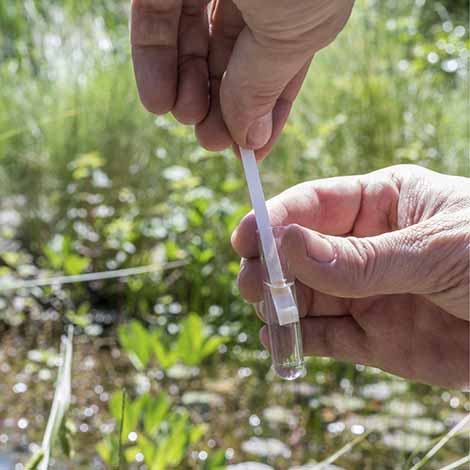Hard water, soft water - you're probably familiar with these terms as they relate to the water flowing through your home's plumbing. But the water in your pond or lake can be hard or soft, too, and it matters to your fish, particularly if you're using algaecides or herbicides.
What is Carbonate Hardness?
Carbonate hardness, or alkalinity, is the measure of carbonate and bicarbonate concentrations in your pond or lake's water. Alkalinity is a measure of the ability of a solution to neutralize acid without changing the pH. It both controls and maintains water pH.
Alkalinity is related to the amount of dissolved calcium, magnesium and other compounds in the water, so alkalinity tends to be higher in harder water. It naturally decreases over time through bacterial action that produces acidic compounds that combine with and reduce the alkalinity components.
In a pond or lake, the alkalinity of the water is critical to the safety of the fish. The carbonate hardness of your pond or lake should ideally fall between 50 ppm and 200 ppm.
Fish Friendly
The beneficiaries of the hard water's buffering calcium and magnesium are your fish. Carbonate hardness in your pond or lake affects the sensitivity of certain fish--mainly trout, koi and goldfish--to the acidifying chemicals found in algaecides and herbicides. If you have high carbonate hardness, or hard water that contains more than 50 ppm of the minerals, the fish are less likely to be affected. As always, read the product label before use and for these more sensitive fish you may also choose to use an algaecide or herbicide that does not contain copper to avoid any issues.
Measuring Minerals
If you're curious about your water's carbonate hardness level, or you plan to use an algaecide or herbicide in your lake that requires hardness to be at about 50 ppm, test your water with a Carbonate Hardness Test Strip.
The strips are easy to use. Simply open the pouch and dip it into the water for three seconds, remove it from the water, wait 20 seconds for the water to mix with the solution on the test strip, and read the results. To see what your water's carbonate hardness is, match the color on the strip to the color block on the package.
Remember to perform this test each time before you treat your pond with herbicides or algaecides as the levels of calcium and magnesium in the water may fluctuate.
Last Updated: May 16, 2024
